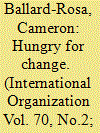| Srl | Item |
| 1 |
ID:
183774


|
|
|
|
|
| Summary/Abstract |
Governments interact strategically with sovereign bond market creditors: they make choices not only about how often and how much to borrow, but also under what terms. The denomination of debt, in domestic or foreign currency, is a critical part of these terms. The “original sin” logic has long predicted that creditors have little appetite for developing-country government debt issued in domestic currency. Our novel data, including bond issues by 131 countries in 240,000 primary market transactions between 1990 and 2016, suggest otherwise. Domestic-denominated bonds have come to dominate the market, although domestic-currency issuance often is accompanied by shorter bond maturities. We argue that ideologically rooted policy preferences play an important role in this unexpected trend in denomination. All else equal, right governments choose foreign denomination as a means of mitigating currency risk and thus minimizing borrowing costs. In contrast, left governments opt for the flexibility of domestic denomination, and they are better able to act on their preferences in the presence of risk-mitigating monetary institutions and macroeconomic stability. We find support for our argument that partisanship has a robust and enduring relationship with denomination outcomes, even in a marketplace in which domestic-denominated developing-country sovereign bonds have become the norm.
|
|
|
|
|
|
|
|
|
|
|
|
|
|
|
|
| 2 |
ID:
147081


|
|
|
|
|
| Summary/Abstract |
What drives autocrats to default on their sovereign debt? This article develops the first theory of sovereign debt default in autocracies that explicitly investigates survival incentives of political actors in nondemocracies. Self-interested elites, fearful of threats to their tenure because of urban unrest, may be willing to endure the long-term borrowing costs that defaulting creates rather than risk the short-term survival costs of removing cheap food policies for urban consumers. I test my main claims that both urbanization and food imports should be associated with greater likelihood of autocratic default using panel data covering forty-three countries over fifty years, finding that autocracies that are more reliant on imported food and that are more urbanized are significantly more likely to be in default on their external sovereign debt. I emphasize the regime-contingent nature of these effects by demonstrating that they are reversed when considering democratic sovereign default. I also substantiate the mechanisms put forward in my theory through illustrative historical cases of sovereign debt default in Zambia and Peru, in which I demonstrate that fear of urban unrest in the face of rapidly increasing food prices did indeed drive autocratic elites to default on international debt obligations. In addition to providing the first political theory of debt default in autocracies, the article introduces two robust predictors of autocratic default that have been overlooked in previous work, and highlights the importance of urban-rural dynamics in nondemocratic regimes.
|
|
|
|
|
|
|
|
|
|
|
|
|
|
|
|